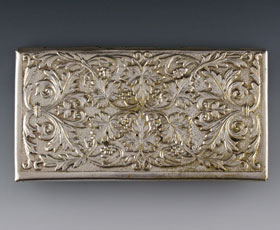Hector

Needle Case

Design Representation
Design Details
Needle Case Type: |
Flat-Names |
Patent/Registered to: |
Elijah Atkins - Birmingham |
Patent/Design Representation #: |
Ornamental Class1 - Metal: #311093 |
Patent/Design Registration Date: |
June 20, 1877 |
Location of Patent/Design Registration: |
The National Archives (TNA) - Kew, UK |
Reference #: |
TNA Representation - BT 43/42/311093
TNA Register - BT 44/4/311093 |
Dimensions: |
8.7 x 4.7 |
Material: |
Nickel-plated |
Name Variations: |
H. Milward & Sons - Redditch |
Other Variations: |
None |
Additional Photographs


Back and interior views


Front details showing nickel-plating


Front diamond registration detail (June 20, 1877) and back detail
Facts
The name Hector derives from Greek mythology. Hektor was the Trojan prince and hero of the Trojan War against the Greek army. In the
Iliad he is described as the greatest defender of Troy earning the respect of the Greeks and the people of Troy alike. He was killed by
Achilles. In the Middle Ages Hector was included as one of nine legendary figures termed the 9 Worthies that were considered to personify the
ideals of chivalry. Another literary link is with the name of the foster father of King Arthur, Sir Ector.

History

Hector MacDonald nicknamed Fighting Mac was born on a farm on Black Isle, Scotland in 1853, the son of a crofter. He was apprenticed to a
draper at 15 but by age 18 was enlisted in the 92nd Gordon Highlanders at Fort George. His rise through the ranks was rapid and he was
promoted to Colour Sergeant a prestigious rank given in recognition of courage on the battlefield. Through his valour during the Second Afghan
War he was given the option of the Victoria Cross or a commission. Choosing a commission be was made a 2nd Lieutenant. He saw action in
the First Boer War where he was mentioned in dispatches. His career included time assisting in reorganizing the Egyptian army and training
Sudanese troops. He was involved in several battles and was awarded the Distinguished Service Order rising to the rank of Major in 1891.
Commanding a battalion of Egyptian and Sudanese troops in the Battle of Omdurman, MacDonald attained hero status, particularly in Scotland, when he
was able to save the day through fast thinking and skilful manoeuvring of his troops after the commander-in-chief, Horatio Kitchener, made a
tactical error which left his troops exposed to the entire Dervish foe. Kitchener received a Lordship and MacDonald promoted to colonel.
He was also appointed Aide de Camp to Queen Victoria. He saw further action in South Africa commanding the Highland Brigade in the Boer
War. In 1901 he was given a knighthood. He was later stationed in Ceylon as Commander-in-chief of British troops. In Ceylon he
ruffled feathers by trying to better discipline the local militia made up mostly of the sons of local planters. He also caused upset by
declining to mix socially with the British community. Rumours began to circulate that he was a practicing homosexual. Accusations
mounted and he was advised by the Governor, who he had previously gotten off side, to return to London. Once there he was ordered to return to
Ceylon to face the charges. While in Paris he read in the newspaper that he was returning to a court martial and fearful of the disgrace shot
himself. It was widely believed that if he had been of other than very humble origin things would not have unfolded as they did. Whether
there was any truth to the charge or it was a conspiracy motivated by jealousy and snobbery, as was claimed in the report of a Government Commission
looking into his death, it was a tragic end for such a distinguished soldier. Memorial towers have been erected at Dingwall and Mulbuie in
Scotland.

Miscellaneous
Promotion through the ranks to a commissioned office at the time was very rare. In the British army the practice of purchasing commissions
was the norm starting in 1683 until 1871 around the time Hector MacDonald enlisted. The system ensured that the vast majority of officers came
from the upper classes and was considered effective because the money paid, the amount depending on rank and prestige of the regiment, was kept as a
bond which could be forfeited in the case of cowardice, desertion or gross misbehaviour. It was seen as reducing of risk of revolution since
the interests of wealthy officers were in maintaining the status quo. When the system was abolished and attendance at the Royal Military
Academy, Sandhurst became the path to a commission, the majority of cadets were from wealthy background since they were required to pay for their
own education, uniforms and other equipment. The expected life style of officers required some independent wealth as well, thus ensuring the
exclusive nature of the officer class.

Note: Right side panel text and photos provided by Lynda Herrod.
















